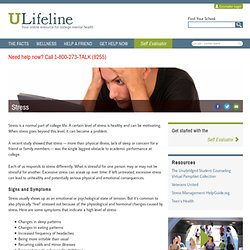

Good Stress, Bad Stress - ULifeline. Feeling stressed can feel perfectly normal, especially during exam time.

You might notice that sometimes being stressed-out motivates you to focus on your work, yet at other times, you feel incredibly overwhelmed and can’t concentrate on anything. While stress affects everyone in different ways, there are two major types of stress: stress that’s beneficial and motivating — good stress — and stress that causes anxiety and even health problems — bad stress. Here’s more on the benefits and side effects of stress and how to tell if you’re experiencing too much stress. Benefit of Stress According to experts, stress is a burst of energy that basically advises you on what to do.
Stress is also a vital warning system, producing the fight-or-flight response. In addition, there are various health benefits with a little bit of stress. Make Your Own Finals Survival Kit. It’s that time of year again: finals week!

That time when you have projects and papers due every day, and you spend more time studying in the library than you do sleeping. Needless to say, it’s a stressful and exhausting week as a college student. To help you survive the end of the semester, here’s how to make your own finals survival kit. Or, if you’re not feeling the stress of exams, you can make one for a friend who really needs it. Fill it with some of the following goodies to help exam week feel a little more bearable!
Make late-night studying better with fun study aids like post-its in different shapes or neon highlighters.Everyone loves mindless snacking while buried in your textbooks. Finals week is always a tough time for college students, because there are so many exams, projects, presentations, and papers all due at once. Featured photo credit: Anomalily via photopin cc. Stress - ULifeline. Stress is a normal part of college life.

A certain level of stress is healthy and can be motivating. When stress goes beyond this level, it can become a problem. A recent study showed that stress — more than physical illness, lack of sleep or concern for a friend or family members — was the single biggest obstacle to academic performance at college. Each of us responds to stress differently. What is stressful for one person may or may not be stressful for another. Signs and Symptoms Stress usually shows up as an emotional or psychological state of tension. Changes in sleep patterns Changes in eating patterns Increased frequency of headaches Being more irritable than usual Recurring colds and minor illnesses Frequent muscle aches and/or tightness Being more disorganized than usual Increased difficulty in getting things done Greater sense of persistent time pressure Increased frustration and anger Getting Help Fortunately, it’s possible to manage and maintain stress at healthy levels.
Feeling Stressed. Stress isn’t always a bad thing.

Some stress pushes us to meet goals by studying more, working harder or sticking with a challenging task. But sometimes stress reaches an unhealthy level that can prevent us from functioning well and meeting our goals. Recent research from The Jed Foundation and MTV found that over half of all college students had been so stressed that they couldn’t function at some point during the last year. Our health, goals and social life can all suffer when stress becomes too much to handle. That’s because stress can affect our moods and ability to think clearly. Chronic stress can lead to — or worsen — serious health problems, including high blood pressure, autoimmune illnesses, digestive issues, depression and anxiety. You can find some tips for managing stress by clicking on “Feel Better.” Learn to Take Back Control of Your Life - Caltech Counseling Center. By Hsing-Fang Chang, Caltech Counseling Center As a graduate student, stress may seem like a shadow that is always tailing you.

There are always stressors: meeting deadlines, research that seems to be going no where, balancing coursework, research and teaching, and so on. In general, there is always too much work and too little time, and you may feel as if you just can’t seem to have a life outside of school. When you do try to have a little bit of a personal life, there comes with it different stressors: meeting new people, managing your relationship with your significant other, having difficulty dealing with emotions, family obligations, etc. What's your Anti-Stress. Symptoms of Stress. Stress and the College Student.